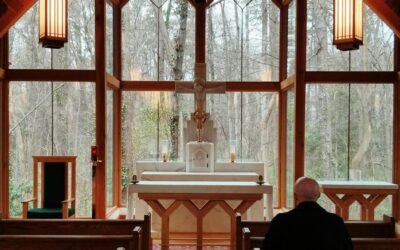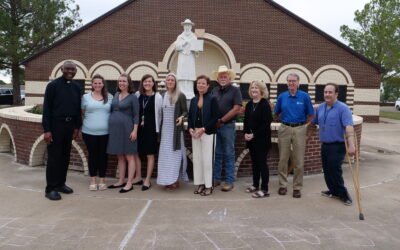Every Person Deserves an Amazing Parish
Almost exactly thirty days ago, I began this new role as the Executive Director of The Amazing Parish. In that time, I have received one question more than any other.
“What is an Amazing Parish?”
It is a good question and an important one. What is an Amazing Parish? What marks it? is it particular ministries or a certain number of attendees on a Sunday?
This question is a critical one for all of us as church leaders to answer today. The parish is the most important institution we have, the backbone of the Catholic Church in the United States. Here alone, we have 17,500 outposts of the Church’s vital, local mission opening their doors and carrying on their work every day. Asking what makes a parish really good at what it does is a very worthwhile exercise.
It is not, however, the first and primary question we should be asking.
We should first ask: why an Amazing Parish?
What is a parish for?
This question is something deeper than Canon Law alone can answer. It is a question of meaning and purpose even more than structure.
Thankfully, the answer is not terribly complex.
The answer to every “Why” question in the Church goes back to a story.
A story of a Father who created us out of love, simply for love.
Of this Father who, when his kids were taken from him, hopelessly lost in sin and death, relentlessly and tirelessly did anything and everything he could to bring us home.
Of a Son who agreed to come rushing to Earth, sent by His Father, to bring His siblings home.
And, finally of a Church, who was sent by the Son to do the same thing His Father had sent him to do, to rush, to every person, in every time and in every place, so that everyone might encounter the “life and life to the full,” he had accomplished for him.
This is why it is said, “The Church exists in order to evangelize” (Evangelii Nuntiandi 41). The Church does much, teaches much, and celebrates much, but exists for a singular purpose: so that all might be brought back to the Father and therein discover the answer to every question and longing of their heart, the only possible answer to the mystery of life and its singular goal.
That Church established parishes, to be stable outposts of that mission, doing much, teaching much, and celebrating much, but existing so that all might have life, and it to the full.
This is why the parish is the most important organization in the world. It is the place where the one story that sits behind all of reality comes crashing into the lives of ordinary people.
The Challenge Facing Our Parishes
Today, though, the parish is encountering many challenges in accomplishing this mission. We are no longer in a “Christendom” time, where the parish existed as the vital core of cultural communities that breathed in and out of parish sanctuaries and halls as part of their daily lives in small towns and urban communities. In an Apostolic Time, like ours, the mode of operating for all of our institutions, especially the most important one, the local parish, is driven to change by necessity.
Realities in a declining, you could say “recessionary,” church climate are creating incredible pressure-filled circumstances for the pastors who lead parishes. In recent years, many of them became priests fully anticipating these challenges, running into the fire, so to speak, and wanting to not merely maintain but lead renewal in these communities.
Often though, they run into circumstances that are challenging and overwhelming beyond their expectations and their control. The land they have been given in which to toil is hard, packed earth, difficult to till, and unpredictable. Many of these problems come down to two main sources: problems of structure and and those of culture.
I spent a year in seminary until God very clearly and gently let me know I was not called to be a priest. I met up with one of my classmates a handful of years later, eleven months after his ordination for a Midwest diocese. He had just been made pastor, eleven months after ordination, of four parishes. To drive the distance between two furthest took him an hour and a half on every Sunday. He was, more than discouraged, completely bewildered.
The questions of structure are beyond a pastor’s authority; they are for courageous bishops to identify and address.
If a pastor wants to draw life from the land he has been given, though, he has been given the authority, the calling, and the mandate to address the problems of culture.
Issues of Culture
What stands in the way of the Church being effective at the mission God gave to it?
It is easy to notice the problems at the surface in many parishes. Any parishioner in the pews on any given Sunday can tell you a dozen things their parish could be doing better.
The question we should be asked though is: why are these problems not addressed?
The core issue here is not one of lack of knowledge or having the right ideas or best practices – it is more often one of dysfunction. Many of our institutions are bogged down by an undercurrent of often intractable dysfunction that makes any attempts to drive change feel like we are spinning our wheels. Two steps forward, three steps back.
This is true in most parishes.
Imagine a really talented young priest. Top grades in seminary, gifted preacher, likable guy – he is ordained and serves two years as an associate in a big parish. Then, maybe, he is made pastor of one or two smaller parishes where he thrives doing ministry for three years. Then, because he is so gifted, he is made pastor of a big, suburban parish. Suddenly, the things that worked in the past aren’t working in the same way anymore. He has to manage a four-million-dollar budget between the parish and the school and all of the requisite councils, committees and lay ministry leaders that are the real locus of power in those communities. The parish is doing well in the things we typically measure, like Sunday offertory and October Mass counts, but he knows it is not really making disciples the way he would like and, more than anything, he is buffeted every day by a host of dysfunctional issues with staff, with key parishioners, with his school. He is not really sure how to get traction without upsetting someone and turning the parish against him.
What does this priest do in this situation? Sadly, this experience can be an even more isolating and pressure-filled one than the four distant parishes.
Maybe he doubles down on his own gifts and education and starts to see some fruit. New young families are coming to the parish because of his gifts at preaching, he makes a few good hires on the staff, and focuses his attention on those areas of ministry which are more life-giving.
The weight of the intractably dysfunctional culture of the rest of the parish though continues to sap his time, energy, and, most importantly, joy and love of the priesthood. He’s burning out, but he is now even more of a visible leader in the diocese and community and feels he cannot show weakness. He is stuck, trapped.
This pastor is being confronted with the need for a kind of courage in leadership he never knew he needed. He knows he needs to change things but is not sure where to start and, even more, he does not feel like he was prepared for this.
Organizational Health is More than “Business Principles”
In a recent study by CARA (Center for Applied Research in the Apostolate), 1,012 recently ordained priests were interviewed on what they felt seminary had prepared them well to do.
Three of the four lowest answers were:
- Communication and conflict management
- Collaborative skills such as building consensus
- Leadership skills such as motivating people
Only 16% of recently ordained priests felt seminary prepared them well to lead in these ways.
This is what the Amazing Parish movement does best.
Amazing Parish works closely with pastors to help them lead transformation in their parish from the inside out, in order to lay a foundation for renewal on solid rock, in a way that brings life to all leaders in the parish.
We call the goal, or genre for how we help leaders transform the culture of their parishes “organizational health” because it is focused before anything else on building a healthy organizational culture. One in which people trust each other and are able to have really good and loving conflict and disagreements. Where they commit to a common vision together and hold each other accountable to the results of a parish made to make disciples. Where silos, confusion, back-biting and dysfunction are replaced by a clear, prayerful, bold, and collaborative culture.
This kind of parish culture might sound like wishful thinking, or Polyanna-ish, but we can introduce you to dozens of pastors who have found that it is anything but that.
Many of these principles of organizational health are pulled from the business world, in particular the thought leadership of the world leader in organizational health, Patrick Lencioni, a devout Catholic, who has lent his insights, models, and heart to painstakingly craft the way Amazing Parish coaches and forms leaders.
The work of organizational health is not aimed at turning parishes into mini-corporations. In recent decades, most corporations have noticed that building culture is a necessary precondition to lasting success and, so, many thought leaders have spent a lot of time thinking about how to do just that. In this sense, like St. Thomas Aquinas, we can pull much wisdom from these Aristotles and baptize them for our context.
How We Do It
More than a program, or a process, the tough journey of parish transformation is about the hard work of inside out culture building and not skipping steps. We refer to our way of working as thinking in terms of five Circles of Influence that have to be successively worked on. Often, when we desire renewal, in the parish, or in the world, we want to jump to address the problems “out there” first – since they are the biggest and the ones we are tempted to worry most about.
In the parable of the sower, Jesus warns us what happens to the fruit that springs up quickly in shallow soil; it withers when the first obstacles arise. We have to build from a healthy foundation.
How does Amazing Parish do that?
Through various means, our team gathers, coaches, and inspires a movement of parish leaders so they can be healthy and effective in leading transformation through five circles of influence.
In a personalized and customized way, in relationship, not in a program, we –
- help pastors recognize their invitation to lead and make the courageous decision to do so, by first building a healthy team. (circle 1)
- grow that team in health and adopt responsibility for the results of the entire parish. “Co-responsibility of the laity” we call that in theology circles. (circle 2)
- help that team extend their culture outward, in order to transform the culture of the parish as an organization in communicating clearly and aligning all of its leadership: its staff, key councils, super volunteers, so that everyone is moving toward the same vision and getting there the same way. (circle 3)
- From here, a foundation of health is laid so that we can help Catholics in the pews be transformed through an encounter with Jesus in the Eucharist and be sent on mission “for the life of the world.” (circles 4-5)
This journey, in full, takes courage and, sometimes, years (though, often, significant change, growth, and momentum can be found surprisingly quickly once it is named and focused on). But we walk with pastors, individually and in community with other pastors, the whole way. Many pastors have found this journey extraordinarily “worth it,” in a way that has renewed priesthoods and saved vocations.
In doing this work for eleven years, the Amazing Parish movement has seen incredible fruit that lasts and multiplies. A program can be canceled by the next pastor. The beauty of leading renewal through changing culture is that it outlasts even the tenure of a pastor.
It also becomes a mindset and a worldview that follows the pastor who decides to lead courageously everywhere he goes. We have had pastors now who have worked with our coaches to cultivate leadership teams and transform parish cultures in two and even three different parish assignments.
Conclusion
So, to answer the question above: what is an Amazing Parish?
Candidly, for a lot of the normal identifiers for what some would consider an Amazing Parish, we are fairly agnostic.
Does an Amazing Parish have a vibrant youth ministry program? Does it have great outreach programs from the parish in the community? The friendliest greeters around?
Maybe! Even, it is fair to say, “hopefully.” Also, maybe not, for any number of reasons.
An Amazing Parish, by definition, is two things. Healthy and Fruitful.
It has to do what a parish is made to do; it has to be Fruitful, i.e. make disciples. But, in every age of the Church, but especially in this one, in order to be Amazing, it has to be more than fruitful. It also has to be Healthy. It needs good soil, that has been fought for so that it might do more than bear fruit, but so that it will “bear fruit that will last.”
For those in the pews, certainly, and maybe especially for the sake of the men who have laid down their lives to lead them.
Tim Glemkowski | Executive Director
Amazing Parish




0 Comments